Last week, in the aftermath of the No Labels debacle, I focused on the Diversity of Voices & Values, while standing to salute Tom Atlee's proposition that integral CITIZENSHIP trumps any form of alleged Transpartisanship.
In the new year my focus is going to be on creating infinite wealth for all–on a moral rebirth of capitalism that harnesses the collective intelligence of all and creates infinite common wealth as a foundation for building a civilization that is conscious, deliberate, evolutionary, and ultimately good for all.
We start today–this week's focus–with a tour of the literature on Bio-Economics. The master list, Book Reviews on Bio-Economics, is in turn broken down into the six categories four of which I cover today–next week I will offer a guide to twelve books on water. Below I offer a short paragraph on the books selected, but for all books, a very long review with links can be accessed through the title link.
Bio-Economics and Natural Harmony
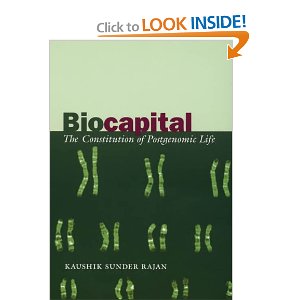
Review: Biocapital-The Constitution of Postgenomic Life
Information Operations (IO) must scale rapidly to encompass the life sciences and to make possible an understanding of the true costs of human initiatives (read predatory capitalism) that draw down on bio-capital. IO must be played in the FUTURE if it is to impact on the present.
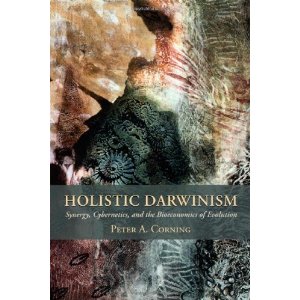
Review: Holistic Darwinism: Synergy, Cybernetics, and the Bioeconomics of Evolution
Short version of the book: Synergy is cool again, synergy and self-organization complement each other and are distinct; bioeconomics is hugely important and supports the premise that the whole is larger than the sum of the parts and that interactions and exchanges can and should be done for the whole, “beyond selfishness,” cybernetics rules, information is the space between, and ethics is both a form of cybernetics and a cultural adaptation that helps the whole evolve and persist.
BIG INSIGHT FOR ME: The more complex a society or superorganism becomes, the more vital it is that it develop faster, better, cheaper feedback loops with less and less corruption of signal. This is consistent with all of my reading on the collapse of complex societies, and the author covers that literature. He does not, however, mention Panarchy: Understanding Transformations in Human and Natural Systems or other related books on resilience.
Other books in this series address Diet for a Small Planet, Human Scale, Intelligence in Nature, the Resilient Earth and Kevin Kelly's prescient Out of Control-The New Biology of Machines, Social Systems, & the Economic World.
Design & Whole Systems Thinking
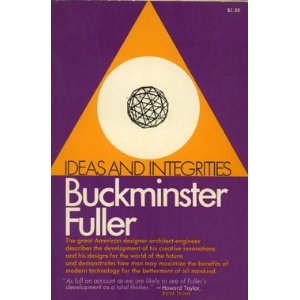
Review: Ideas and Integrities-A Spontaneous Autobiographical Disclosure
CORE POINT: True wealth is cosmic energy and the creation of means to deliver to humanity unlimited free energy. Among many other things this creates the possibility of applying energy to create self-contained homes that are lightweight, fully self-contained in water and sewage, and totally green.
CORE CONCEPT: Capitalism and democracy have been perverted by money-those who manage money manage those who manage politics, and they both concentrate on optimizing the false God of money, an abstract concept hardly worth its paper representation, while ignoring-even subverting-the possibility of achieving infinite cosmic wealth on behalf of all of humanity.
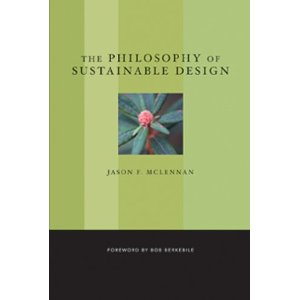
Review: The Philosophy of Sustainable Design
This book is at the intersection of global science, sustainable political and social and economic orders, and the vulnerability of the nation-state in the face of growing complexity for some time, as well as the literatures of collective intelligence, global assemblages, wealth of networks, localized resilience, and so on.
The seven core principles discussed include Biomimicry, Human Vitality, Ecosystem/Bioregional, Seven Generations, Energy/True Cost, and Holistic Thinking. The book includes appendices on green design. It could–it should–be required reading for all who aspire to ANY undergraduate or graduate degree.
I have not reviewed but want to also point to three books on design for humanity.
Ecological Economics
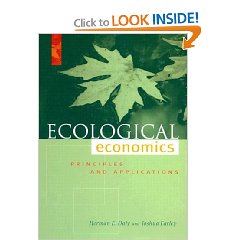
Review: Ecological Economics-Principles And Applications
Dr. Herman E. Daly is the author, co-author, or primary contributing editor of many books that fully integrate the disciplines of economics and ecology. It is an honor to know him–if we ever get it right, he will be, along with Buckminster Fuller and Russell Ackoff, among those whose minds illuminated the righteous path.
Tables of contents rarely do justice to the contents but in this case, they excel. This is one of the most intelligent, structured, useful outlines it has been my privilege to examine. Read the Table of Contents information provided by the publisher to satisfy yourself. From Part I with three chapters (An Introduction to Ecological Economics) to Part II with 4 chapters (The Containing and Sustaining Ecosystem: The Whole) to Parts III and IV (Microeconomics and Macroeconomics, respectively, five and four chapters each) to Part V with four chapters (International Trade), and finally to Part VI (Policy) with chapters on General Policy Design Principles, on Sustainable Scale, on Just Distribution, and on Efficient Allocation, the content of the book is elegantly organized and accurately described.

Although another book, Valuing the Earth: Economics, Ecology, Ethics, is part of the Daly trilogy, I favor this one because it is less academic and more down to earth. Part One tears apart prevailing practices among economics who are both ignorant and shameless servants to the few who have the power to dismiss humanity as a commodity. Part Two introduces the reader to the many distinguished thought-leaders and practitioners who have gradually matured the discipline of economics to embrace humanity, community, and sustainability as non-negotiable realities that cannot be ignored.
Part Three, a major factor in my choosing this book over the others for broad pro-bono distribution, addresses the specifics of policies one element at a time: free trade versus community; population; land use; agriculture; industry; labor; income policies and taxes; from world domination to national security as an objective. Finally, Part Four, without being corny or preachy, describes the religious or ethical vision (I still think the Golden Rule works as a one-sentence definition of common interest).
Ecological Intelligence & “True Cost”
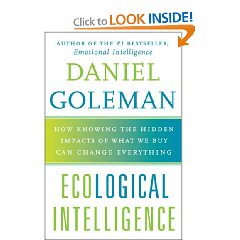
Review: Ecological Intelligence-How Knowing the Hidden Impacts of What We Buy Can Change Everything
The author's “big idea” is called “Radical Transparency,” what the rest of us have been calling “Open Books” for decades. I like it, and in the context of his elegant story-telling, I buy in. This book also goes to a five because it is an Information Operations (IO) books, ably focused on data, information, and information-sharing as well as collective sense-making. He author anticipates most of us becoming “active agents” for change, armed with information as Thomas Jefferson understood so well.
Bottom line: Activists that used to lobby governments for regulations are now recognizing that shared information delivered directly to the consumer is the Holy Grail of doing good, at the same time that corporations are starting to “get” sustainable design equals sustainable profit.
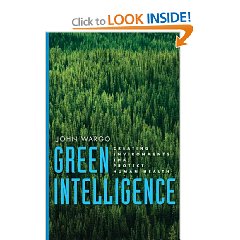
Review: Green Intelligence: Creating Environments that Protect Human Health
The intelligence-information perspective–and the emphasis on public information gaps that need urgent attention–carries the book to a solid five.
I have written a very long summative review of this work and urge interested readers to study the long review. The author is devastating on how government sanctioned commercial secrecy about chemicals and toxins is preventing proper analytics and harming the public interest. This book adds to my understanding of Information Operations (IO) as being a life-cycle process, constantly studying everything in relation to everything across time and space and all boundaries.
WHAT IS TO BE DONE?
The more I study the collapse of complex societies, and most particularly the United States of America (USA), the more I see the precious value of the human brain, infinite in its imagination and diversity of perspective, and the pathological nature of the current information environment in which “rule by secrecy” enables the concentration of wealth by the few at cosmic expense to the many. In my Politics contribution this week I will discuss The New Craft of Cyber-Intelligence–a blending of advanced public intelligence and advanced Information Operations (IO).
We can create infinite wealth for all, but first we must get a grip on all information in all languages all the time. I am devoted to this outcome–a world that works for all.



